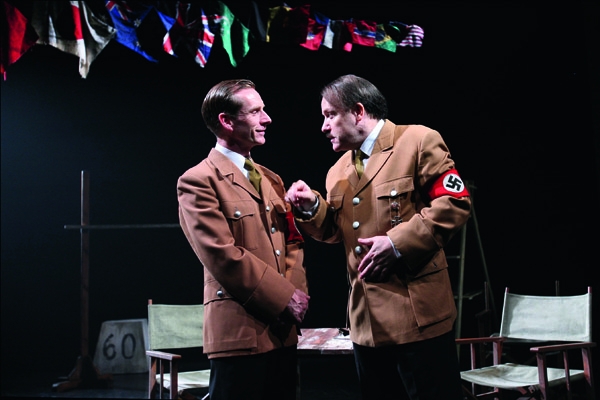A timely show at the Finborough takes us into the heart of Bashar al-Assad’s terror state. Zoe Lafferty’s verbatim piece gathers evidence from activists and torture victims and flings it straight at us. The result is utterly gruesome and utterly compelling. A fractured, blood-stained snapshot of an ancient monstrosity blundering towards its own funeral.
Syria, a Russian sidekick state, still pursues the traditions of Marxist totalitarianism. Every morning, ranks of schoolkids salute their leader. ‘Unity, Freedom, Socialism’ they chant in honour of a regime which traduces all three ideals. The Alawi minority, making up 12 per cent of the population, controls everything. Western music and literature are ruthlessly censored. The 75 per cent Sunni majority are oppressed and cut off from opportunity. The army’s junior ranks, predominantly Sunni, thus have every reason to overthrow their superiors. This internal combustibility may accelerate Assad’s journey from office to exile.
The most harrowing testimony comes from a mother who rushed to her window to cheer ‘Allah-o-Akbar’ as a crowd of protestors marched below.
‘The words Allah-o-Akbar make Bashar go insane. No one can be bigger than Bashar.’ Secret servicemen machine-gunned her seven-year-old daughter. The mother (played by a horrifically persuasive Sirine Saba) describes how this altered her character. Just listen to her.
‘Junar was the joy of my heart. She was the project of my life in this world. She was a breath. I do breathe Junar, I breathe my daughter. She was my friend and my companion and they took her from me. I am now a body without a soul. A body without breathing. I want revenge. I have the courage to hold a gun and kill Bashar al-Assad and the children of Bashar al-Assad. I wish, when this dog falls, to be the one who will be pointing the gun.’
The concentration, the bluntness and the measured ferocity of this speech represent something you rarely find in any dramatic tradition. Only war could produce such rhetoric. At the same time, it exemplifies the difference between poetry (thought building language) and lyricism (language ornamenting thought). Our home-grown playwrights, raised in affluence and tranquillity, have no access to emotions of this intensity, still less the power to express them with such tender and intimate rage. For that, of course, we should be grateful.
Another timely production at Lilian Baylis. Jenny Lee’s elegant and assured revival of Tom McNab’s play takes us through the story of the Berlin Olympics. Hitler regarded the International Olympic Committee as a nest of Freemasons and Jews but Goebbels convinced him that the Games would make a great photo-op for the Third Reich. We’re offered a brilliant glimpse of the weird Hitler–Goebbels relationship. Hitler struts around like a petulant dauphin, demanding this, that and the other. Goebbels shadows him fretfully, an overprotective guardian, trying to anticipate his every wish. We see them touring the half-finished Reichssportfeld in 1935. Hitler is satisfied. Well, nearly. ‘Where is the Olympic bell?’ he asks. There is no Olympic bell. Goebbels conjures one from his imagination. A bell weighing 15,000kg, he announces to the Führer, has been commissioned from a trusty Westphalian forge. ‘And what will the inscription read?’ Hitler wants to know. There is no inscription either. Goebbels improvises again. ‘Ich rufe die Jugend der Welt,’ he says. ‘I call the youth of the world.’ Hitler is delighted.
Across the Atlantic we meet one of history’s greatest sportsmen. Jesse Owens. At a race meeting in May 1935, Owens equalled three world records and smashed three more. All in just 45 minutes. Then, having redefined the boundaries of human endeavour, he had to go to work. And he worked as an elevator boy. Ohio State University, where he was a student, refused him a scholarship because his skin was the wrong colour. Professional baseball was closed to him too but Owens accepted these restrictions without bitterness. The height of his ambition, he said, was to buy himself a laundry. A laundry!
McNab’s play is full of these entertaining surprises and it neatly counterpoises America’s prejudice against blacks with the mistreatment of Jews in Germany. Owens refused to be drawn into the political horse-trading of the white elite. Asked to lead a boycott of the Olympics, he declined on the grounds that America’s withdrawal wouldn’t help Germany’s Jews.
But once in Berlin he found his own way to stick it to Hitler. He offered his place in the sprint relay team to Marty Glickman, an American Jew. The offer was refused. Owens took his fourth gold medal and when he returned to the US he was rewarded with a ticker-tape parade through New York and a five-star suite in a swanky Manhattan hotel. Only one snag, though. He had to enter via the kitchen.







Comments